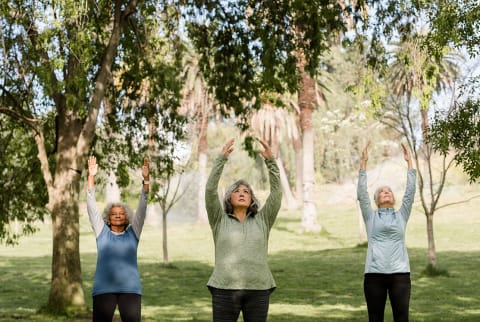Advertisement
Enhance Your Memory & Promote Mental Resilience With These Simple Tips


Whether recalling an acquaintance's name or trying to figure out where you parked, your memory helps you access short-term and long-term information and process the world around you.
We could all use a little extra mental strength to help us remember important things, right? Well, it turns out there are research-backed ways to support brain health and enhance memory:
Eat for your brain
Nutritional psychiatry is a field of science that uses food and supplements to provide essential nutrients and phytonutrients that help support an individual's mental health needs.* In other words, making strategic dietary changes can support your individual mental well-being and overall cognitive function.
Here are some nutritional changes you can make to increase brain function and improve memory:
- Limit added sugars, refined grains, and processed foods
- Increase animal protein, healthy fats, and antioxidants
- Support your metabolism by determining what and when to eat
- Maintain balanced blood sugar levels
Get plenty of Omega-3s
Speaking of healthy fats, omega-3 fatty acids are vital for overall cognitive function and enhancing memory—particularly EPA and DHA, which are omega-3 fatty acids found primarily in marine sources (fish and algae).*
Consuming adequate amounts of omega-3s has been shown to benefit cognitive health, and DHA in particular (with or without EPA) has been proved to improve working and episodic memory, strengthen general neuroprotection, increase blood flow to the brain, and more.* High-quality omega-3 supplements with a healthy daily dose of these healthy lipids (i.e., 1,000 milligrams of EPA plus DHA and higher)—such as mindbodygreen's omega-3 potency+, which boasts 1,500 milligrams of the marine omega-3s per serving from sustainably sourced, cold-water fish—are an easy way to support your memory and a host of brain functions.*
Move your body
Exercise is medicine for the body and the brain. Studies have shown that aerobic and cardiorespiratory exercise increase white and gray matter in the brain, respectively. Gray matter is responsible for the majority of processing that occurs in the brain, while white matter is more involved in communication within the brain and between the brain and spinal cord—all of which are important for memory function.
So, how much movement do we need to maintain optimal mental health? One cross-sectional study11 published in Lancet Psychiatry reveals the sweet spot for reaping all the mental wellness benefits: 30 to 60 minutes three to five times a week is all you need (of course, more movement is great!) to support mental well-being and improve your mood.
Zen out
Meditation and other mindfulness practices have certainly gained growing attention over the past few years—and for good reason! Meditation has been proved to lengthen telomeres (a biomarker for longevity) and improve overall brain function. More specifically, meditation increases gray matter in the brain22 and helps enhance memory and learning33.
If you're new to meditation, follow these 10 tips to ease into a sustainable daily practice.
Hit the hay
It's no surprise that sleep is critical for our overall well-being, but did you know that it plays a specific and vital role in healthy memory? While you're sleeping each night, your brain takes all the information from the day and trims down the unnecessary bits so it can properly store what is essential.
Getting your seven to nine hours of restful sleep ensures the right memories are retained—so be sure to call it a night a little bit earlier if you're hoping to supercharge your memory while you sleep!
The takeaway
When it comes to enhancing your memory, making small, consistent improvements each day to your nutrition, sleep, and movement habits can make a massive difference over your lifetime. Consider these tips your "long-term study strategy" for a life of strong memory and mental wellness.
